
Peter Victor Ueberroth is an American sports and business executive known for his involvement in the Olympics and in Major League Baseball. A Los Angeles–based businessman, he was the chairman of the Los Angeles Olympic Organizing Committee which brought the games to Los Angeles in 1984. Ueberroth was named 1984's Time Man of the Year for his success in organizing the Olympic games.
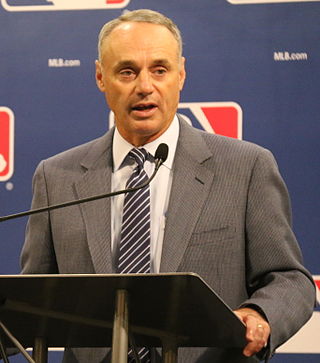
The commissioner of baseball is the chief executive officer of Major League Baseball (MLB) and the associated Minor League Baseball (MiLB) – a constellation of leagues and clubs known as "organized baseball". Under the direction of the commissioner, the Office of the Commissioner of Baseball hires and maintains the sport's umpiring crews, and negotiates marketing, labor, and television contracts. The commissioner is chosen by a vote of the owners of the teams. The incumbent MLB commissioner is Rob Manfred, who assumed office on January 25, 2015.
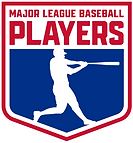
The Major League Baseball Players Association (MLBPA) is the labor union representing all current Major League Baseball players. All players, managers, coaches, and athletic trainers who hold or have held a signed contract with a Major League club are eligible for membership in the Association.
The Seitz decision was a ruling by arbitrator Peter Seitz (1905–1983) on December 23, 1975, which declared that Major League Baseball (MLB) players became free agents upon playing one year for their team without a contract, effectively nullifying baseball's reserve clause. The ruling was issued in regard to pitchers Andy Messersmith and Dave McNally.
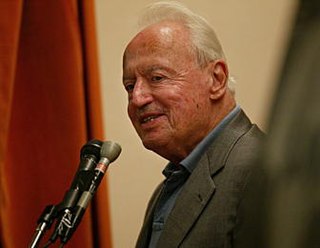
Marvin Julian Miller was an American labor union leader and baseball executive who served as the executive director of the Major League Baseball Players Association (MLBPA) from 1966 to 1982. Miller led MLBPA during three strikes and two lockouts. Under Miller's direction, the players' union was transformed into one of the strongest unions in the United States.

Scott Dean Boras is an American sports agent, specializing in baseball. He is the founder, owner and president of the Boras Corporation, a sports agency based in Newport Beach, California, that represents roughly 175 professional baseball clients.

The Major League Baseball draft is the primary mechanism by which Major League Baseball (MLB) assigns amateur baseball players from high schools, colleges, and other amateur baseball clubs to its teams. The draft order is determined by a lottery system, starting in 2023, where teams that did not make the postseason in the previous year participate in a state-lottery style process to determine the first six picks. The team with the worst record has the best odds of receiving the first pick. Prior to 2023, the draft order was based on the previous season's standings, with the worst team selecting first.

The 2022 Major League Baseball draft took place on July 17–19, 2022, in Los Angeles. The draft assigned amateur baseball players to Major League Baseball (MLB) teams. The draft order was based on the reverse order of the 2021 MLB season standings. In addition, compensation picks were distributed for players who did not sign from the 2021 MLB Draft.

The 2022 Washington Nationals season was the Nationals' 18th season as the baseball franchise of Major League Baseball in the District of Columbia, the 15th season at Nationals Park, and the 54th since the original team was started in Montreal, Quebec, Canada. The Nationals failed to improve on their 65–97 record from the previous year, losing 107 games, having the worst record in the major leagues for the first time since 2009. The 107 losses came just three years after their first World Series title in 2019. It also marked the first time since 2009 that the Nationals lost 100 or more games in one season. In addition, it is the fifth time in franchise history that the Nationals lost 100 or more games, along with 1969, 1976, 2008, and 2009. To further add to Washington's dismal season, Juan Soto, along with Josh Bell, left the team via a trade to the San Diego Padres during the trade deadline.

The 2022 Cincinnati Reds season was the 153rd season for the franchise in Major League Baseball, and their 20th at Great American Ball Park in Cincinnati.

The 2022 Pittsburgh Pirates season was the franchise's 141st season overall, 136th season as a member of the National League, and 22nd season at PNC Park.

The 2022 Colorado Rockies season was the 30th in Major League Baseball. It was their 28th season at Coors Field. Manager Bud Black returned for his sixth season with the Rockies in 2022.

The 2022 San Diego Padres season was the 54th season of the San Diego Padres franchise. The Padres play their home games at Petco Park as members of Major League Baseball's National League West.
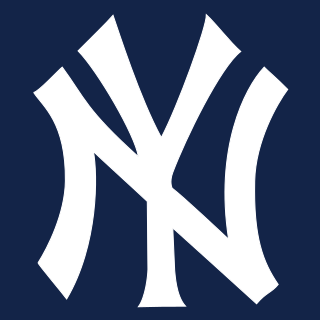
The 2022 New York Yankees season was the 120th season for the New York Yankees franchise.

The 2022 San Francisco Giants season was the 140th season for the franchise in Major League Baseball, their 65th year in San Francisco, and their 23rd at Oracle Park. This was the third season under manager Gabe Kapler and also the first season since 2008 without longtime catcher Buster Posey, who retired the previous November.
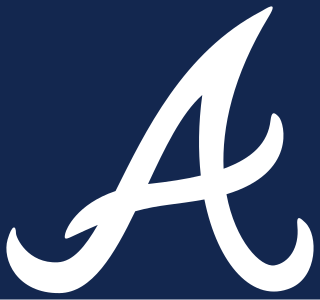
The 2022 Atlanta Braves season was the 152nd season of the Atlanta Braves franchise, the 57th in Atlanta, and the Braves' sixth season at Truist Park. The Braves were managed by Brian Snitker, in his seventh season as the team’s manager.
The 2021–22 Major League Baseball lockout was the ninth work stoppage in Major League Baseball (MLB) history. It began at 12:01 a.m. EST on December 2, 2021, after MLB owners voted unanimously to enact a lockout upon the expiration of the 2016 collective bargaining agreement (CBA) between the league and the Major League Baseball Players Association (MLBPA). It ended on March 10, 2022, with the signing of a new agreement. Issues raised between the league and union involved compensation for young players and limitations on tanking to receive higher selections in the MLB draft.
Free agency in Major League Baseball (MLB) concerns players whose contracts with a team have expired and who are therefore eligible to sign with another team. Free agents may be eligible for pendulum arbitration, also called "salary arbitration" or just "arbitration" in baseball circles.

Prior to the 1966 Major League Baseball season, from February 28 to March 30, future Hall of Famers Sandy Koufax and Don Drysdale, star pitchers for the Los Angeles Dodgers, staged a joint holdout in which the pair demanded a fair negotiation and better contract terms from their team's front office.
Jews have been involved in baseball since the sport's beginnings and have contributed to its evolution in many capacities, including players, agents, team owners, executives, umpires, broadcasters, and fans. In the United States, particularly, baseball played a large part in the assimilation of American Jews into American society at a time of rampant antisemitism and when Jews were immigrating to America to escape persecution. Today, it remains a very important part in Jewish American culture.
















